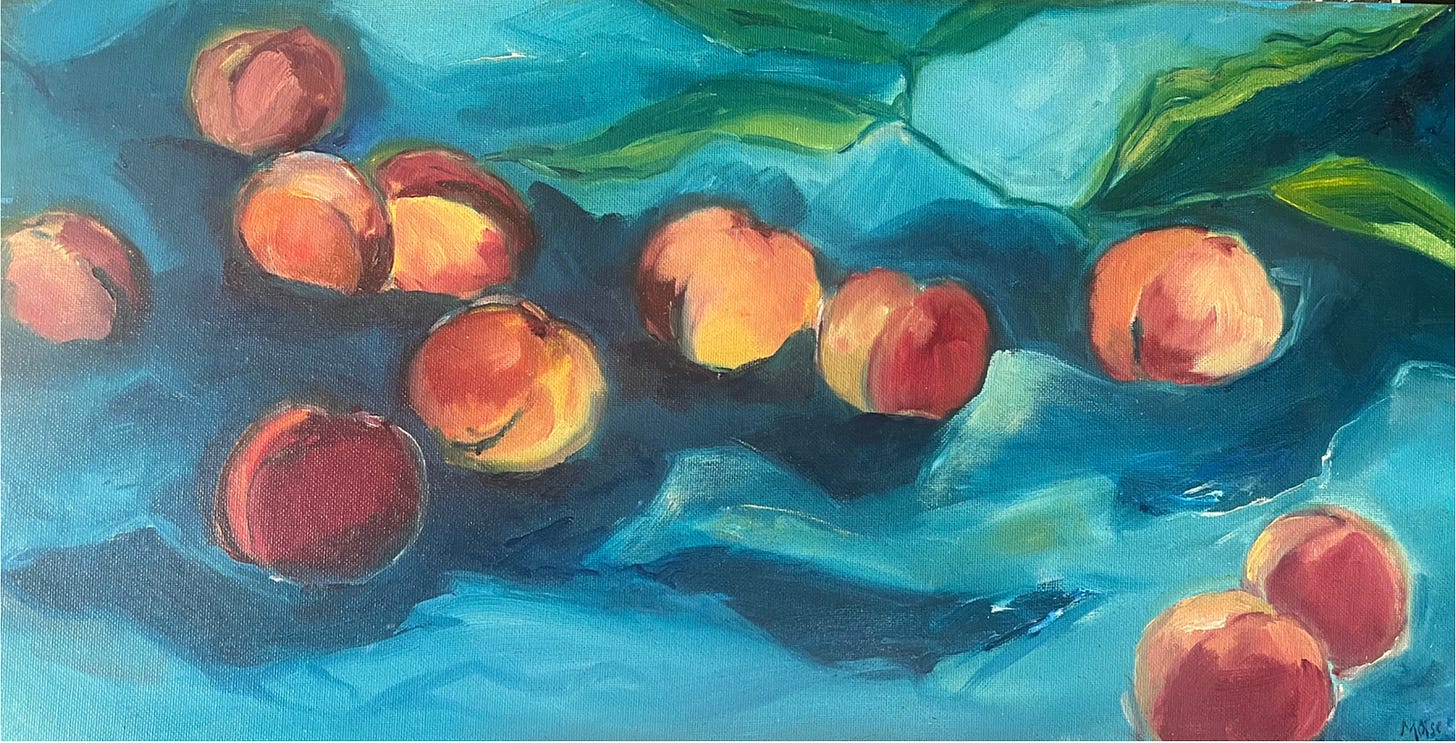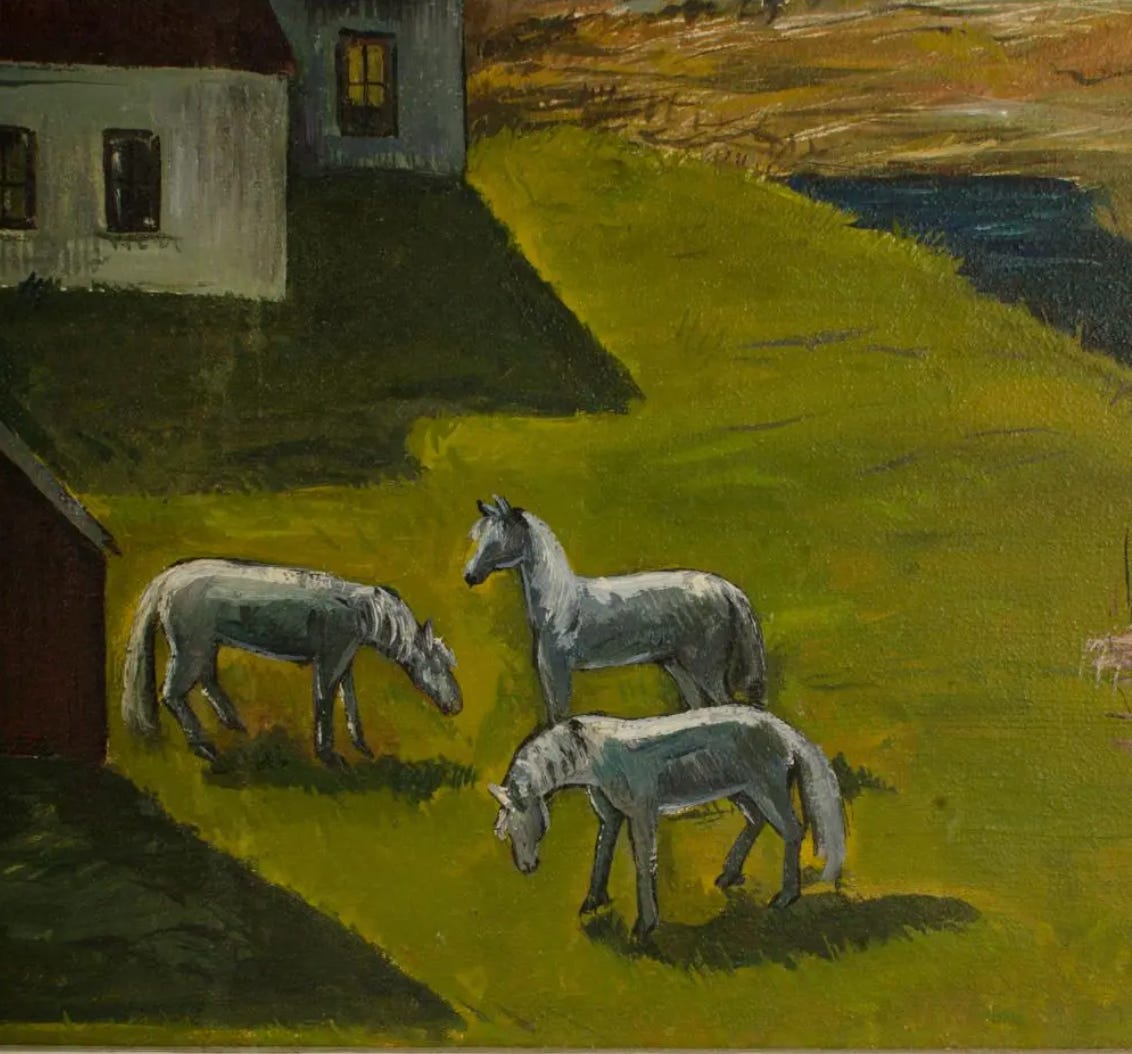Of Horses, Peaches, Pears, and Poems
. . . Musings Place and Need of Poetic Language in Our Lives
Recently, I’ve been thinking about the kinds of language people consume daily, and the amounts in which they consume it. For me personally, when complicated or shocking things are happening fast, it’s so easy to binge on the plentiful, readily available language produced by journalists and experts in a variety of fields (including sports commentators).
Even at its most thoughtful best, this language, especially in the absence of other kinds of language, reflects and perpetuates a particular view of what most deserves our attention. When I consume vast amounts of this language, I notice that I listen to less music and read less literature. This creates an imbalance in my life that makes it easier for anger and despair to rule my day, my week, even my month. I suspect the same may be true for other people.
Initially, I wanted to blame this phenomenon on the easy 24-hour availability of that language. But assigning blame and figuring out why journalists’ and experts’ language dominates isn’t the point. The point is to identify what kinds of language we need in what proportions to keep ourselves healthy, well-balanced, and happy enough—I didn’t say happy—while we live our lives during trying times.
In the old days, food pyramids helped us think our way through our healthy food consumption. Nowadays, something like food plates, which have replaced food pyramids, can guide us similarly: what varieties of language should we fill our plates with, and in what amounts? The broad categories of literary and non-literary language may be subdivided into such subcategories as lyrical, narrative, expository, technical, and persuasive language. But it might make even more sense for each of us individually to create our own subcategories—maybe you’d prefer poetic, social, spiritual, activist, sports-analytical, technical, explanatory, political, and even off-color?

What I know about myself is that I need a substantial amount of literary language on my plate to be healthy. Currently, I’m finding it in Elizabeth Strout’s Anything is Possible and in the poems being written and studied in the Poetry Barn writing course* I’m taking called Here, There, and Otherwhere: Dreaming Spaces in Your Poems. The course has been reminding me that the world is awash in poetry that also can be accessed twenty-four hours a day. Books of poetry abound, as do websites featuring poems and discussions of them. There’s no reason we can’t turn to them when we’ve heard enough for the day about how America’s president is tying torches to the tails of foxes in preparation for setting them loose in fields and orchards here and abroad. (Yes, that last sentence featured literary language, and a biblical allusion at that.)
I mention orchards because the second week of my poetry course, when I remarked to my teacher that two of the poems she’d chosen for instructional purposes contained orchards, she referred me to Brigit Pegeen Kelly’s collection of poems called The Orchard and specifically to Kelly’s beautiful poem “The Leaving.”
In it is an orchard of peaches** that the speaker’s father said she couldn’t successfully pick, but she does—immediately reminding me of Manuel Munoz’s short story “Anyone Can Do It” in which Delfina stays the peach-picking course at a disconcerting and defining life moment.** I love when literature leads me forward towards and back to other literature—especially when it’s literature that emphasizes human dignity sustained in the face of challenge—which is not to say that the literature I consume must reflect my values, portray a world I would love to live in, or render experiences I would like to have. If anything, literature often lets me sit with and consider values, worlds, and experiences that I otherwise might resist.
Picking peaches as a solitary, self-affirming activity was on my mind as Week III of the course began. Jane Medved’s “That We Awake from Sleep is Evidence for the Resurrection” offered in lieu of peaches and an orchard “luminous pears, placed side by side” and an internal “'pasture” containing a “horse . . . / reaching for the fence with its velvet nose.”
Medved’s internal horse sent me back to two of my all-time favorite external horse poems—poems in which the speakers encounter horses and feel so much joy: James Wright’s “A Blessing” (actually, they’re Indian ponies in “A Blessing”) and Mark Doty’s “Source.'“ Both poems raise the question about poetry’s capacity to evoke the poet’s literal and emotional experience,*** but Doty’s speaker raises the question directly, in part by comparing experience to “an intact fruit”:
Experience is an intact fruit,
core and flesh and rind of it; once cut upon,
entered, it can’t be the same, can it?
Though that is the dream of the poem:
as if we could look out
through the moment’s blushed skin.
According to Doty’s speaker, the poet enters the experience, cuts into it, and then attempts to render it so it can be experienced as he experienced it. A little later, he again speaks directly to the reader, this time in an imperative statement that bridges two stanzas to assert that “cut open” experience can be tasted sufficiently through poetry: “Put your tongue to the green-flecked// peel of it and taste it/ from the inside.”
I would say that that statement is true when poetry is really, really good—and Doty’s poetry is! But a little later, Doty’s speaker again doubts his poetry’s potential, even if I’m more convinced of it:
The poem wants the impossible:
the poem wants a name for the kind of nothing
at the core of time, out of which the foals
come tumbling: curled, fetal, dreaming, . . ..
That’s the thing about literary language, especially when it’s found in poetry, which can definitely be weird and that by its very nature seeks just the right words and names for things. You can’t just read it or listen to it. You have to be willing to stick your tongue out and press it up against the “green-flecked peel.” You have to be willing to grapple and engage. And even if you are, you might not be glad you did or be otherwise rewarded for your efforts. You have to like grappling and engaging.
Not everyone likes poetry’s novelty, complexity, ambiguity, and the effort they require. But many people love when literary language in whatever genre they prefer pulls them into a world, allowing them either to escape this one, and/or to think differently, more deeply, or more perceptively about it.
Though there’s bountiful literary language in the world, it often lives in the shadows and at the margins of a world dominated by language less “disputable,” more apt to be heard and understood in only one way. Perhaps that’s to be expected. And the point of this post is not to debate which is “better,” literary language or non-literary language—though so many people are always wanting to know what’s best or more important when anything is being discussed.
The point is that we need both, that we each may need them in different proportions, and that we can find both in different forms and places.*
So let me end this post in a silly but serious—and also literary—way: I think it would be peachy if my idea about conscientiously filling our language plates came to fruition!I It just makes a lot of horse sense to me. (And yes, that’s a shift in tone—maybe not what the doctor/veterinarian ordered.)
** “Peaches on Blue” by/from Moisepaintings, https://www.renatamoise.com/product/peaches-on-blue
** I blogged about Manuel’s story in 2021. It appears in his short story collection The Consquences, but also appeared in The Best American Short Stories 2019.








Fiction rewards us by laying to rest one raging controversy at least; is it real? In fact, it's by definition all fake news-fake news that reveals larger worlds of truth and meaning!
You’ve provided food for thought and brought a smile to my face this morning, Joan. Thank you!